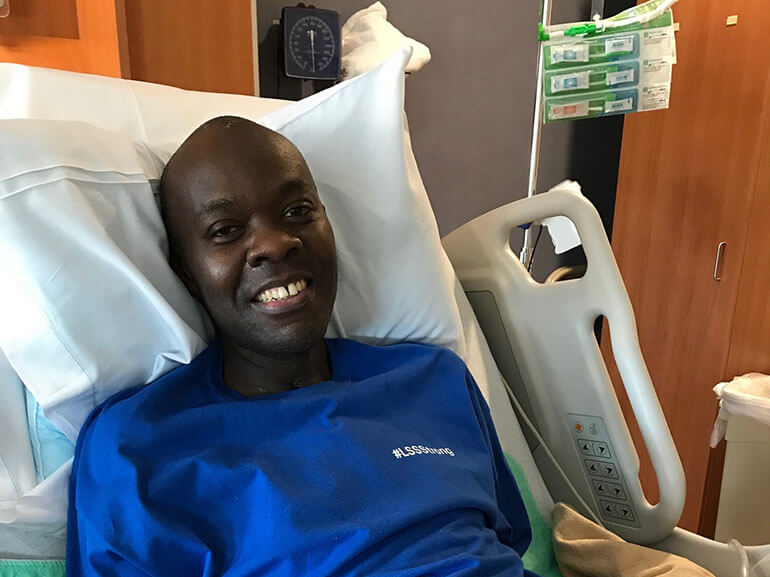Gerald's story

Gerald “Gerry” Adory, 41, is a native of Kenya who has lived in St. Louis since 2007. The nursing home LPN and his wife, Lakeitha, have a son, Emmanuel and a daughter, Imani. One morning in September, Gerry awoke with slurred speech. Concerned, Lakeitha insisted that Gerry needed to go to the hospital and called 911. Upon arrival, he was admitted and diagnosed with COVID-19.
In the hospital, Gerry became increasingly confused, and at one point had to be restrained. Soon after, he became unresponsive and had to be given a feeding tube, tracheostomy and was put on a ventilator. He spent the next 38 days in a coma and a total of 45 days on a ventilator.
“He had so many challenges,” Lakeitha said. “When he first woke up from his coma, he was not alert so all he could do in the beginning was open his eyes. He was confused and when I would do video calls with him, he didn’t know who I was.”
When Gerry was liberated from the ventilator, he experienced kidney failure and had to undergo dialysis. He also was paralyzed and unable to move his arms or legs and could not eat, drink or speak clearly. His physicians ordered an MRI which showed blood clots on his brain and one on his spine which was causing further issues.
Gerry was hospitalized for nearly two months before he was stable enough to begin the next step in his recovery journey. After researching options, Lakeitha chose SSM Health Rehabilitation Hospital – Bridgeton.
Upon admission, Gerry required maximum assistance to move and for all of his personal care. He was also unable to swallow so was continuing to receive all nourishment from his feeding tube. Gerry shared his goals, “I want to walk and use my hands. I want people to understand me when I speak, and I want to be able to eat.”
His physician-led team of nurses and physical, occupational and speech therapists developed a plan to help Gerry get there. Because he was a nurse, Gerry’s therapists noted that he was very knowledgeable and involved in his care. In physical therapy sessions, Gerry and his therapists worked on transfer training with a sliding board and a Hoyer lift as well as wheelchair mobility with a power wheelchair. They also did a variety of exercises to help Gerry regain motion in his legs. “In physical therapy, I liked the transfer board and doing the leg exercises. I liked working on the mat, especially when they would sit me at the edge so that I could practice by myself. It’s something that a normal person would do.”
Because Gerry was admitted to the rehabilitation hospital with a feeding tube, he required speech therapy to relearn how to move his tongue and swallow again. His speech therapists worked with him on tongue exercises, repeating various words, family member’s names and short sentences so that people could better understand him. They also worked on practicing swallowing thin liquids and pureed solids like pudding, applesauce and mashed potatoes. When Gerry had his first lunch tray of pureed food of mashed potatoes and gravy, his speech therapist recalls, “Gerry had the biggest smile on his face and it said ‘I feel like I hit the jackpot. This is good!’”
Occupational therapists also worked to get Gerry into a power wheelchair as soon as possible to increase his independence with mobility. Because he was immobile for weeks, his muscles were very tight and painful with any movement. His sessions focused on stretching and strengthening his muscles through a variety of exercises. Therapists also used kinesiology tape to change muscle tone, move lymphatic fluids, correct movement patterns and improve posture in both of Gerry’s shoulders to help with stability.
After 19 days of intensive therapy, Gerry made great strides. He was able to move his tongue, communicate using speech strategies and consume thin liquids and pureed solids. Gerry was also able to sit without assistance and use his wheelchair independently. “My legs are still not moving, but I’m optimistic,” Gerry said.
He is grateful for the support of his family, who prayed for him, and the involvement of his wife, who underwent training on how to help him upon returning home. She also kept him motivated to push through tough and sometimes painful therapy sessions. Overall, Gerry said, “I believed in myself. At first I was losing hope, but my therapy team cared that I was there and motivated me to meet my goals. Everyone was rooting for me.”